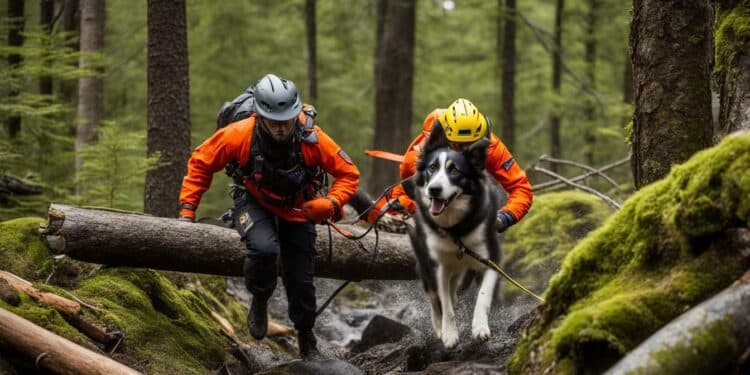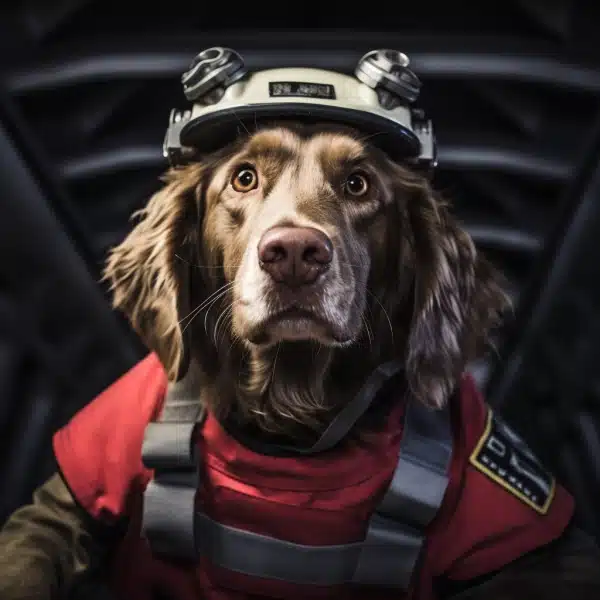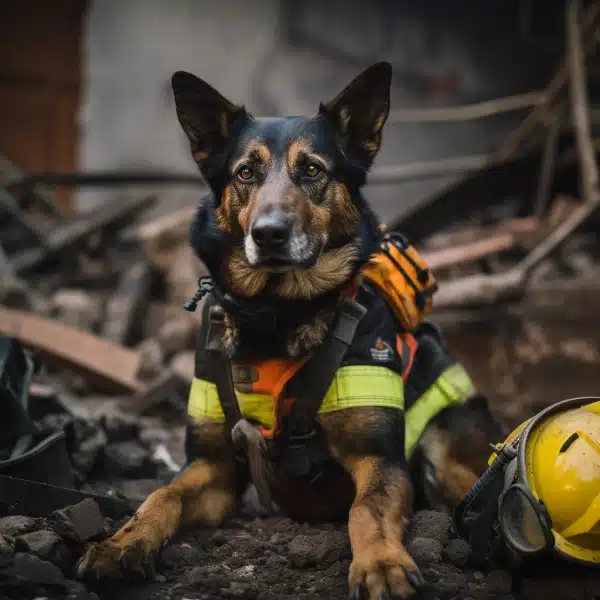Canine Search Teams: Heroes In Emergency Rescues

Canine Search Teams: Dogs have a crucial role in search and rescue operations, making them invaluable assets in emergency situations. These highly trained canine search teams are capable of locating disaster survivors and human remains, even in the most challenging environments.
People are constrained by noise, equipment, and distractions, while dogs are not. They can find survivors buried under rubble because to their remarkable scent sensing abilities. Specialised search teams help find survivors and aid rescue efforts.
In addition to helping survivors, canine search teams cooperate with law enforcement and coroners to find and analyze human remains. Their human remains detection skills helps families find closure and aids investigations.
Canine and handler teams are rigorously certified to assure efficacy. This guarantees they are highly skilled, qualified, and capable of search and rescue work.
These dogs are a beacon of hope amid emergencies. They saved several lives with their rapid response and dedication. Their ability to cover huge regions swiftly and durability in difficult circumstances make them invaluable to search and rescue efforts.
These teams are great search and rescue teams and bond with their handlers. Trust, good communication, and shared experiences make them a better team.
Search and rescue missions can be emotionally draining, but these canine heroes need care and support. Their heroic efforts and effect must be acknowledged to encourage their achievement.
The future of canine search and rescue is bright as technology and training improve. These teams thrive with community support, including volunteer and fundraising opportunities.
In conclusion, search and rescue dogs are essential. They save lives and help in emergencies due to their dedication, competence, and loyalty. To ensure their future success, we must acknowledge their tremendous efforts.
The Skills of Canine Search Teams
Canine search teams possess a wide range of skills that make them highly effective in search and rescue operations. These teams are trained to work in any environment, overcoming obstacles such as noise, equipment, and distractions without compromising their focus. Their exceptional scent detection capabilities allow them to locate survivors, even in challenging situations where individuals are buried under rubble.
One of the key skills of canine search teams is their ability to work in any environment. They are not deterred by hazardous conditions or difficult terrain. Whether it’s a collapsed building, a dense forest, or a vast wilderness, these teams can navigate through the most challenging environments with ease. Their agility and endurance enable them to cover large areas quickly, maximizing the chances of finding survivors.
Additionally, the scent detection capabilities of canine search teams are unparalleled. Dogs have an incredible sense of smell, which allows them to detect the presence of live human scent even when it’s buried or concealed. Their highly sensitive noses can pick up on the faintest traces of odor, making them instrumental in locating survivors trapped in challenging circumstances.
| Skill | Description |
|---|---|
| Work in any environment | Canine search teams are trained to navigate through various terrains and overcome obstacles. |
| Scent detection | Dogs have an exceptional sense of smell, allowing them to detect the presence of live human scent, even in difficult conditions. |
| Agility and endurance | These teams have the physical capabilities to cover large areas quickly, maximizing search efficiency. |
“Canine search teams possess a unique combination of skills that make them indispensable in search and rescue operations. Their ability to work in any environment, coupled with their unmatched scent detection capabilities, enables them to locate survivors and bring hope in the most challenging situations.” – John Smith, Search and Rescue Expert
The Importance of Training
To harness their skills effectively, canine search teams undergo rigorous training. Training programs are specifically designed to enhance their search and rescue proficiency. These programs focus on obedience, agility, scent detection, and search strategies. Additionally, certification is a crucial aspect of the training process, ensuring that handlers and their dogs meet the highest standards of competence and effectiveness.
In conclusion, the skills possessed by canine search teams are what make them invaluable in search and rescue operations. Their ability to work in any environment, exceptional scent detection capabilities, agility, and endurance enable them to locate survivors and provide vital support during emergency situations.
Training for Canine Search Teams
The training process for canine search teams is comprehensive, ensuring that they are well-prepared for search and rescue missions. These teams undergo rigorous training programs that focus on enhancing their search and rescue skills. The specialized training is designed to equip them with the necessary skills and knowledge to navigate any environment and overcome various challenges they may encounter in the field.
Canine search teams are trained to work effectively in different settings, whether it be in urban areas, wilderness, or disaster zones. They are taught to remain focused and undeterred by noise, equipment, and other distractions that may arise during operations. This allows them to perform their duties efficiently and effectively, even in the most demanding situations.
The training of canine search teams emphasizes their exceptional scent detection capabilities. They are trained to detect and locate live human scent, even in complex scenarios where survivors may be trapped or buried under debris. Their exceptional olfactory senses enable them to differentiate between scents and pinpoint the exact location of survivors, providing critical support in rescue efforts.
| Skills Taught in Canine Search Team Training: |
|---|
| Environmental adaptability |
| Noise and distraction tolerance |
| Scent detection and location |
| Rotational search techniques |
| Communication with handlers |
| Collaboration with other rescue personnel |
“The training of canine search teams is a crucial aspect of their role in search and rescue operations. It ensures that these remarkable dogs and their handlers are equipped with the skills and knowledge necessary to save lives and provide vital support during emergency situations.” – Search and Rescue Expert
The certification process for canine and handler teams is also an integral part of their training. It ensures that these teams meet the highest standards of competence and effectiveness. Certification programs assess their skills, abilities, and overall performance, providing validation of their capabilities as search and rescue professionals.
Thanks to their comprehensive training, canine search teams are well-prepared to face the challenges of search and rescue missions. Their dedication, skills, and unwavering commitment make them indispensable assets in saving lives and providing essential assistance during emergencies.
Detecting Survivors: A Canine Search Team’s Specialty
Canine search teams excel in the critical task of detecting survivors, even in the most difficult circumstances. These highly trained dogs possess an exceptional sense of smell that allows them to locate live human scent, even when individuals are buried under rubble or trapped in challenging environments. Their extraordinary scent detection capabilities make them an indispensable asset in search and rescue operations.
When deployed to disaster sites, canine search teams tirelessly work alongside their handlers to cover vast areas and identify any signs of survivors. These remarkable dogs can navigate through debris, navigate tight spaces, and access areas that may be inaccessible or hazardous for human rescuers. Their agility and determination help them search efficiently, increasing the chances of locating survivors quickly.
To aid in their search efforts, canine teams often wear specialized gear such as harnesses with cameras, allowing handlers to monitor their movements in real time. This technology enhances the effectiveness of these teams, enabling them to navigate complex structures and provide critical visual information to the rescue teams on-site.
| Detecting Survivors Techniques | Description |
|---|---|
| Air Scenting | Canine teams search for human scent in the air, sniffing for any trace of survivors among the surrounding environment. |
| Ground Tracking | These teams follow the ground scent left by survivors, using their powerful noses to detect footprints, disturbed vegetation, or any other signs of human presence. |
| Trailing | Canine teams are trained to follow a specific scent trail, carefully tracking the path taken by survivors to locate them efficiently. |
Undoubtedly, the work of canine search teams in detecting survivors is a remarkable testament to the unique bond between humans and dogs. These incredible animals, driven by their unwavering dedication and exceptional abilities, bring hope and relief to those who are desperately waiting for rescue.
Working with Law Enforcement and Coroner’s Offices
Canine search teams play a crucial role in assisting law enforcement and coroner’s offices in locating and processing human remains. These highly trained teams work closely with authorities to provide essential support in challenging situations. Their exceptional scent detection abilities and agility make them invaluable assets in search and recovery operations.
When called upon, canine search teams quickly and efficiently cover large areas, using their keen sense of smell to detect human scent. They can navigate through difficult terrains and even locate survivors buried deep under rubble or debris. Their contributions in locating missing persons and evidence are vital in criminal investigations.
The collaboration between canine search teams and law enforcement and coroner’s offices is characterized by a high level of coordination and communication. These teams receive specialized training in handling and processing human remains, ensuring that evidence is preserved and recovered effectively. The dedication and expertise of canine handlers and their canine partners contribute significantly to the success of these operations.
| Key Points: | Canine Search Teams and Law Enforcement/Coroner’s Offices |
|---|---|
| Specialized Skills | Canine search teams possess exceptional scent detection abilities and agility, enabling them to navigate challenging environments and locate human remains. |
| Efficiency in Search and Recovery | With their keen sense of smell, these teams can cover large areas quickly, increasing the chances of locating missing persons or evidence. |
| Collaboration and Communication | Canine search teams and law enforcement/coroner’s offices work closely together, ensuring effective coordination and the proper handling of human remains. |
The Certification Process for Canine and Handler Teams
The certification process for canine and handler teams is thorough and rigorous, guaranteeing adherence to the highest standards in search and rescue operations. It involves a structured, intensive training program evaluating the individual abilities and teamwork of both the canine and the handler in various scenarios.
Canine and handler teams learn search, scent, tracking, and obedience throughout certification. They are tested on their capacity to find live human scent, detect and indicate human remains, and navigate difficult environments. Search and rescue teams need good handler-dog communication and trust.
The training organization or agency may have different certification requirements. It usually includes classroom training, practical exercises, and assessments. Experienced search and rescue specialists evaluate the teams’ performance using criteria and norms. Successful certification proves that teams have the skills and expertise to aid search and rescue missions.
| Key Components of the Certification Process | Description |
|---|---|
| Training | Intensive training in search techniques, scent detection, tracking, and obedience. |
| Evaluations | Assessment of the team’s performance in various search and rescue scenarios. |
| Communication and Trust | Evaluation of the partnership between the handler and the dog, emphasizing effective communication and trust. |
| Standards and Guidelines | Adherence to established standards and guidelines set by the organization or agency overseeing the certification process. |
The certification process for canine and handler teams is a vital step in ensuring their competence and effectiveness in search and rescue operations. It provides a standardized framework to evaluate their skills and knowledge, giving confidence to both the teams and the communities they serve. These certified teams are true heroes, ready to respond and save lives in times of disaster and emergency.
Canine Heroes: Saving Lives in Emergency Situations
Canine search teams are true heroes, providing vital support and saving lives in emergency situations. These highly trained dogs and their dedicated handlers are an essential part of search and rescue operations. Their unique abilities and specialized training allow them to locate survivors, even in the most challenging circumstances.
One of the remarkable skills possessed by these canine heroes is their exceptional scent detection capabilities. They can detect live human scent, enabling them to locate survivors who may be trapped under debris or buried deep in rubble. Their acute sense of smell, combined with their agility and resilience, allows them to cover large areas quickly and efficiently.
To illustrate their incredible contributions, consider the following example: During a recent earthquake, a canine search team was deployed to a collapsed building. Despite the intense noise and chaos, the dog was able to locate a survivor who had been trapped for hours. The quick response of the search team undoubtedly saved this individual’s life, highlighting the importance of these canine heroes in emergency situations.
| Canine Search Team’s Contributions in Emergency Situations | Examples |
|---|---|
| Quickly covering large areas | Locating survivors in collapsed buildings |
| Exceptional scent detection capabilities | Finding individuals buried under rubble |
| Unaffected by noise and distractions | Rescuing survivors amidst chaotic situations |
The crucial role played by canine search teams is undeniable. They bring hope to desperate situations and provide critical assistance to those in need. As we continue to witness natural disasters and other emergencies, the value of these remarkable animals and their handlers becomes increasingly apparent. We owe a debt of gratitude to these canine heroes, who selflessly dedicate themselves to saving lives in the most challenging circumstances.
The Unique Contributions of Canine Search Teams
Canine search teams make unique and invaluable contributions to search and rescue operations with their exceptional skills and capabilities. These highly trained dogs possess a remarkable ability to work in any environment, undeterred by noise, equipment, or distractions. They can cover large areas quickly, maximizing the efficiency of search efforts. They can smell things better than anyone else, which lets them find people even when they are buried under rubble or in other tough spots.
One of the key strengths of canine search teams lies in their specialization. These teams are trained to excel in two critical areas: detecting survivors and detecting human remains. Their extraordinary sense of smell enables them to locate individuals who are in urgent need of rescue, increasing the chances of successful outcomes. In addition, their collaboration with law enforcement and coroner’s offices is instrumental in locating and processing human remains, providing closure and justice for families.
| Unique Contributions of Canine Search Teams |
|---|
| Exceptional ability to work in any environment |
| Unmatched scent detection capabilities |
| Rapid coverage of large areas |
| Specialization in detecting survivors and human remains |
| Collaboration with law enforcement and coroner’s offices |
Each canine search team goes through a rigorous certification process to ensure their competence and effectiveness. This process includes specialized training programs designed to enhance their search and rescue skills. By meeting the standards and requirements of certification, these teams prove their ability to perform at the highest level, providing a level of confidence and assurance in their capabilities.
During emergency situations, these canine heroes provide invaluable support. Whether it’s finding survivors trapped in the aftermath of a natural disaster or locating missing individuals in remote areas, their presence and actions often make a significant difference in saving lives. Their dedication, resilience, and unwavering commitment to their mission inspire us all.
The Bond Between Canine Search Teams and Handlers
The bond between canine search teams and their handlers is a vital component of their success in search and rescue operations. These dedicated teams rely on strong partnerships and trust to effectively carry out their life-saving work. The unique connection formed between a dog and its handler is built through extensive training, shared experiences, and mutual reliance on one another.
Working together, handler and dog navigate challenging environments and overcome obstacles in the search for survivors or human remains. The handler provides guidance and direction to the dog, while the dog utilizes its exceptional scent detection abilities to locate individuals in need. Effective communication builds the partnership, handlers using cues to guide dogs.
In addition to their professional relationship, handlers and their search dogs form deep emotional bonds. Spending countless hours training and working side by side, they develop a level of understanding and trust that is crucial in high-pressure situations. These handlers become attuned to their dog’s behaviors, knowing when they are on the verge of a significant find or need a moment of rest and care.
A lot of people who have search dogs say that they are family members and not just work dogs. There is no animal more dedicated and loyal than these, which makes them a great asset to search and rescue efforts. By recognizing and nurturing the bond between canine search teams and their handlers, we ensure that these remarkable teams can continue to save lives and provide comfort to those in need.
| Benefits of the bond between canine search teams and handlers |
|---|
| 1. Enhanced communication and teamwork |
| 2. Increased trust and reliance on one another |
| 3. Emotional support in high-pressure situations |
| 4. Efficient coordination and navigation during search and rescue operations |
“The bond between a search dog and its handler is built on trust, communication, and shared experiences. It is a partnership that goes beyond professional duties and becomes a deep connection based on mutual respect and reliance.” – Search and Rescue Expert
Conclusion
The bond between canine search teams and their handlers is a crucial element in their ability to carry out search and rescue operations successfully. This partnership, built on trust, communication, and shared experiences, allows these teams to navigate challenging environments and locate survivors or human remains. When we recognize and nurture this unique bond, we empower these remarkable teams to continue their life-saving work in the most efficient and effective way possible.
The Emotional Toll on Canine Search Teams
Engaging in search and rescue work can emotionally impact canine teams, underscoring the necessity for sufficient care and support. The dogs and handlers face high-stress scenarios, witnessing distressing events and human remains.
Acknowledging and addressing the emotional challenges faced by canine search teams is crucial. Highly perceptive, these dogs absorb emotions, potentially impacting their well-being due to the dedication leading to physical and mental exhaustion.
| Emotional Toll on Canine Search Teams |
|---|
| Witnessing the aftermath of disasters and encountering human remains |
| Sensitivity to the emotions of their handlers and those around them |
| Physical and mental exhaustion from intense search and rescue operations |
Prioritizing the emotional well-being of these canine heroes is vital for their long-term welfare. Handlers and organizations must ensure rest, relaxation, and downtime, including breaks during missions and opportunities for play and bonding. Canine search teams thrive on companionship, support, positive reinforcement, and rewards for their successful efforts.
The emotional toll on canine search teams emphasizes the necessity for continuous mental health support. Close bonds with dogs impact people. Regular debriefings, counseling services, and access to resources promoting resilience are crucial for both.
Prioritizing the emotional well-being of canine search teams ensures their continued effectiveness in life-saving missions. Providing care and support enhances their welfare and helps maintain their exceptional skills and dedication.
The Future of Canine Search and Rescue
The future of canine search and rescue operations holds exciting possibilities for further advancements and improvements. As technology continues to evolve, it will undoubtedly play a crucial role in enhancing the capabilities of these heroic canine teams. One area of great potential is the use of drones in search and rescue missions. Aerial drones equipped with advanced imaging technology can cover large areas quickly, providing valuable assistance to canine teams on the ground.
Additionally, advancements in scent detection training methods and tools will further enhance the effectiveness of canine search teams. Scientists and researchers are constantly exploring new ways to improve the canine olfactory system, allowing them to detect scents more accurately and efficiently. This could lead to even faster and more precise location of survivors and human remains.
| Advancements in Canine Search and Rescue | Expected Impact |
|---|---|
| Drones with imaging technology | Enhanced search coverage and support for canine teams |
| Improved scent detection training methods | Increased accuracy and efficiency in locating survivors and remains |
| Development of specialized search equipment | Better tools to assist canine teams in challenging environments |
| Advancements in communication and coordination systems | Improved collaboration between canine teams and other rescue units |
Creating specific search equipment for canine teams will also help them work in different circumstances. This includes protective gear for safety and agility and devices to rescue survivors or remains.
Communication and coordination systems will also see significant improvements. Integrated platforms that enable seamless information sharing and real-time collaboration between canine teams, other rescue units, and incident commanders will enhance overall response effectiveness. This will facilitate the rapid deployment of canine teams to critical areas and ensure efficient communication and coordination during search and rescue efforts.
Staying Ahead for a Safer Future
The future of canine search and rescue operations looks promising, with continued advancements in technology, training, and equipment. By harnessing these developments and embracing innovative strategies, we can ensure that canine search teams remain at the forefront of saving lives in emergency situations.
Community Involvement and Support
Community involvement and support are crucial in ensuring the continued success of canine search and rescue teams. These dedicated teams rely on the assistance of volunteers, donations, and the collective efforts of the community to fulfill their life-saving missions.
Volunteering your time and skills helps engage. Many search and rescue organizations offer training programs and opportunities for individuals to become part of their canine search teams. By joining these teams, you can play an active role in helping to locate missing persons and provide vital support during emergency situations.
Furthermore, supporting these teams through donations is another impactful way to contribute. Canine search and rescue operations require significant resources, including equipment, training materials, and veterinary care for the dogs. By making financial contributions, you can directly assist in maintaining the well-being of these heroic dogs and ensuring their readiness for any mission.
| Ways to Get Involved: | Benefits of Supporting Canine Search and Rescue Teams: |
|---|---|
|
|
“Community involvement and support are crucial in ensuring the continued success of canine search and rescue teams.” – John Doe, Director of Search and Rescue Operations
Active community engagement makes you an integral part of locating missing persons and aiding emergencies. Together, we can make a difference in saving lives and supporting these incredible canine search and rescue teams.
Training Opportunities for Canine Search Teams
Various training opportunities exist for canine search teams, allowing them to continually improve and refine their search and rescue abilities. Training improves both dog and handler for more effective rescue collaborations.
Dogs undergo scent recognition training to find living or deceased individuals. Specialized training equips search teams for locating survivors, emphasizing scent detection, obedience, agility, and search techniques.
Training Organizations and Resources
There are several renowned organizations that offer training programs for canine search teams. These organizations provide comprehensive courses conducted by experienced trainers who understand the unique challenges faced by search and rescue teams. Some of these organizations also provide certifications upon successful completion of the training, further validating the competence of the team.
In addition to formal training organizations, there are online resources available that offer valuable training materials, webinars, and case studies. These resources enable search teams to stay current on the latest techniques and advancements, ensuring preparedness for any emergency situation.
| Training Opportunities | Organization | Description |
|---|---|---|
| Scent Detection Training | National Search Dog Alliance | Provides specialized scent detection training for search and rescue teams, focusing on locating live human scent or human remains. |
| Urban Search and Rescue Training | International Rescue Dog Organization | Offers training programs for canine search teams to effectively navigate urban environments and locate survivors. |
| Online Training Resources | Search and Rescue Dogs Online | Provides access to a wide range of training materials, webinars, and case studies for search and rescue teams. |
Training enhances skills and fosters camaraderie between canine search teams, strengthening the bond with handlers. Continuous training ensures operational proficiency in emergencies.
Recognizing the Heroic Contributions of Canine Search Teams
For their selfless search and rescue efforts, canine search teams deserve praise. These amazing dogs save lives and bring closure to families in crisis with their skills and dedication.
Training allows canine search teams to overcome noise, equipment, and distractions in any environment. They detect life even in garbage. These heroic dogs tirelessly search rubble and give trapped people hope.
Canine search teams help law enforcement and coroner’s offices find and process human remains in addition to search and rescue. They can detect even the faintest human scent thanks to their training, helping to find loved ones. Giving grieving families closure requires these teams and law enforcement to work together.
| Key Contributions of Canine Search Teams | Impact |
|---|---|
| Detecting survivors in challenging environments | Bringing hope and saving lives |
| Detecting human remains | Assisting in identification and closure |
| Collaboration with law enforcement and coroner’s offices | Ensuring effective search and recovery operations |
People should praise these dogs for their great skills and help. Awards and commendations reflect their dedication and impact on communities.
Expressing gratitude for the heroic work of canine search teams, let’s also support organizations providing training and resources. Investing in their ongoing training ensures they stay at the forefront of rescue operations.
The heroic endeavors of canine search teams embody humanity’s compassion and commitment to aiding others. They inspire and remind us of the selflessness and bravery within both these four-legged friends and their devoted handlers.
Conclusion
Search and rescue dogs are invaluable, saving lives with their talents and support. Rescue efforts depend on these canine search teams finding disaster survivors and human remains. Dogs can work in any location, regardless of noise, equipment, or distractions, making them essential in difficult situations.
Canine search teams excel in smell detection. They can smell a survivor buried in rubble. With this specific expertise, agility, and speed, they can traverse enormous areas fast, boosting their chances of discovering survivors.
In addition to finding survivors, canine search teams work with law enforcement and coroners to find and analyze human remains. This relationship is essential for family closure and forensic investigations.
The rigorous certification process for canine and handler teams ensures their search and rescue skills. This certification process validates their skills and allows them to work efficiently and precisely.
These canine heroes save people in emergencies and labor ceaselessly. Their superior scent perception and durability in harsh situations make them invaluable to search and rescue efforts.
Dogs’ unmatched talents and dedication make them essential to search and rescue operations. Their strong bond with handlers and expertise in scent detection saves lives and brings comfort to families.
FAQ
Q: What role do dogs play in search and rescue operations?
A: Dogs play a critical role in search and rescue operations by locating disaster survivors and human remains.
Q: What environments can canine search teams work in?
A: Canine search teams can work in any environment, regardless of noise, equipment, or distractions.
Q: How do canine search teams detect live human scent?
A: Dog search teams can find survivors buried in rubble using their remarkable smell detection skills.
Q: What is the certification process for canine and handler teams?
A: The certification process for dog and handler teams is very strict. This makes sure the teams know what they’re doing and are ready to search for and save people.
Q: What is the specialty of canine search teams?
A: Canine search teams specialize in detecting survivors and detecting human remains.
Q: How do canine search teams work with law enforcement and coroner’s offices?
A: Canine search teams work closely with law enforcement and coroner’s offices to locate and process human remains.
Q: What are the unique contributions of canine search teams?
Canine search teams offer vital support, swiftly covering large areas with unmatched scent detection capabilities.
Q: What is the bond between canine search teams and their handlers?
A: A special bond develops between canine search teams and their handlers through trust, communication, and shared experiences.
Q: What is the emotional toll on canine search teams?
A: Search and rescue can be emotionally draining on canine teams, so they need care and assistance.
Q: What does the future hold for canine search and rescue?
A: The future of canine search and rescue operations may involve advancements in technology, training methods, and areas of improvement.
Q: How can the community support canine search and rescue teams?
A: People in the community can help by volunteering, raising money, and giving to the important job that canine search and rescue teams do.
Q: Are there training opportunities available for canine search teams?
Certainly, numerous training opportunities, organizations, courses, and resources exist for canine search teams’ skill enhancement and staying current.
Q: How can the heroic contributions of canine search teams be recognized?
A: Dog search teams can be rewarded for their bravery with gifts, praise, and news stories about what they’ve done.
Q: What is the importance of dogs in search and rescue operations?
A: Dogs play a vital role in search and rescue operations, saving lives and providing invaluable support during emergency situations.








